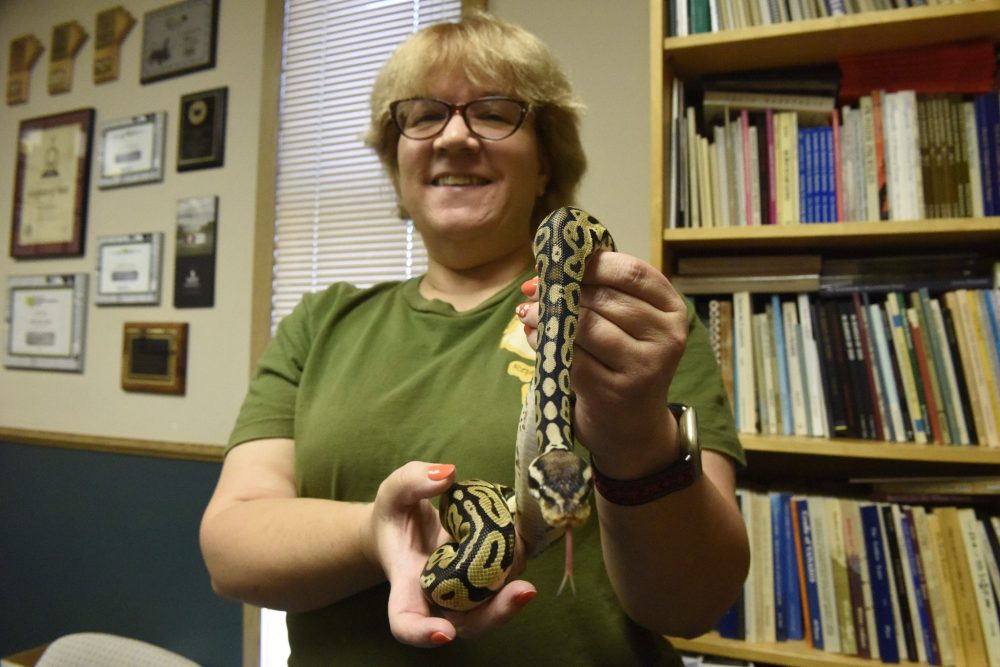Reptile Rescue has tips for those looking to adopt
Advertisement
Hey there, time traveller!
This article was published 11/09/2023 (713 days ago), so information in it may no longer be current.
Boberta’s Dragons Reptile Rescue in La Broquerie has only been in operation for a year but during that time it has rescued almost three animals a month.
“We’ve only been in operation since last April and we’ve had over 35 animals come in just over one year. Of those, we’ve unfortunately had three that have passed away and we have two more that have become permanent residents just because their health care needs were too much for us to be able to adopt them all (out), because they need specialized care for the rest of their lives. Other than the five or six that we currently have up for adoption or being rehabbed right now, we have been able to find all the rest good homes,” said owner Annette Lyss.
She said the reason people surrender their animals is because they don’t have good information on how to take care of them, since COVID-19 people don’t have the time to look after their pets anymore, because the animal has grown larger than they expected, or because the animal becomes sick and they don’t have the resources to take care of it.

And lack of proper information on how to raise and take care of their reptiles seems to be the main reason for the animals at the rescue. Lyss said large chain pet stores don’t usually give the correct information. She said if you want to buy a reptile you should seek a reputable breeder or specialized pet store such as Winnipeg Reptiles.
“Reptiles can survive a lot but they don’t thrive (if they’re not taken care of). It isn’t difficult, but you need to know what you’re doing,” she said.
Lyss began her journey of rescuing reptiles when her friend gave her a bearded dragon to keep at her school’s library where she worked as a librarian. Her friend would look after the dragon and all Lyss had to do was house it, but two weeks later her friend died and Lyss was left to look after the dragon. She had to research how to take care of him and his special needs as the vet told her the dragon’s bones had little calcium and they were like rubber. When the dragon died of cancer, the idea to open a rescue came to mind.
“We officially opened in April and within six month we probably had half a dozen animals,” she said.
When Lyss gets an animal the first thing she does is give it a quick exam and then she takes it to the vet for a wellness check. Once at the vet she finds out how healthy the animal is and if it needs rehabilitation or if it can be adopted right away.
“We take every animal that comes in, to the vet for a wellness check and that doesn’t cost that much. It’s actually less expensive when I used to have a cat but if they find something wrong then it’s usually a quick course of antibiotics or something minor that you have to change. If you wait until they show that they’re sick then it becomes a lot more costly to rehab them.”
Some of the difficulties of having a reptile as a pet are the upfront costs of equipment and supplies. Lyss estimated it could cost more than $1,000 to get started but the costs are low once everything is in place. The other difficulty of owning a reptile is you have to socialize it. If you don’t socialize the animal it will not allow you to handle it.
Some of the benefits of owning a reptile is that it’s hypoallergenic, it’s easy to take care of, and it will interact with you.
“If you are wanting to get a pet reptile or any pet make sure you do your research first. A pet should never be an impulse buy. You should always know what you want first, get the equipment, and then get the pet,” said Lyss. “It’s not like a dog or a cat where you can go and pick it up and slowly get the things that you need. You need to be prepared. I would say get your animal from a reputable breeder or specialty store or a rescue because then you’ll be getting the education that you need to take care of the animal.”
Lyss charges about $100 for someone to adopt one of her animals. The cost covers vet bills and equipment. But prices change depending on the animal. She currently has a larger healthy young bearded dragon that she is adopting out for $450. Animals with special needs are cheaper because it will cost the owner more to take care of it.
“I keep the price low because I want to adopt them out, but I don’t want to make it too cheap because then someone can buy it and start breeding it. Everyone who adopts an animal signs a contract stating they will not breed the animal once adopted because it’s unethical to breed rescue animals since you don’t know their history,” she said.
Lyss said it costs more than $10,000 for her to run her rescue depending on the number of animals and the costs associated with taking care of them. She said donations are down and she’s had to turn animals away because she doesn’t have the funds to cover the costs of taking them in. Anyone who wants to make a donation to Boberta’s Dragon Reptile Rescue can do so through e-transfer to queen.boberta@gmail.com.
